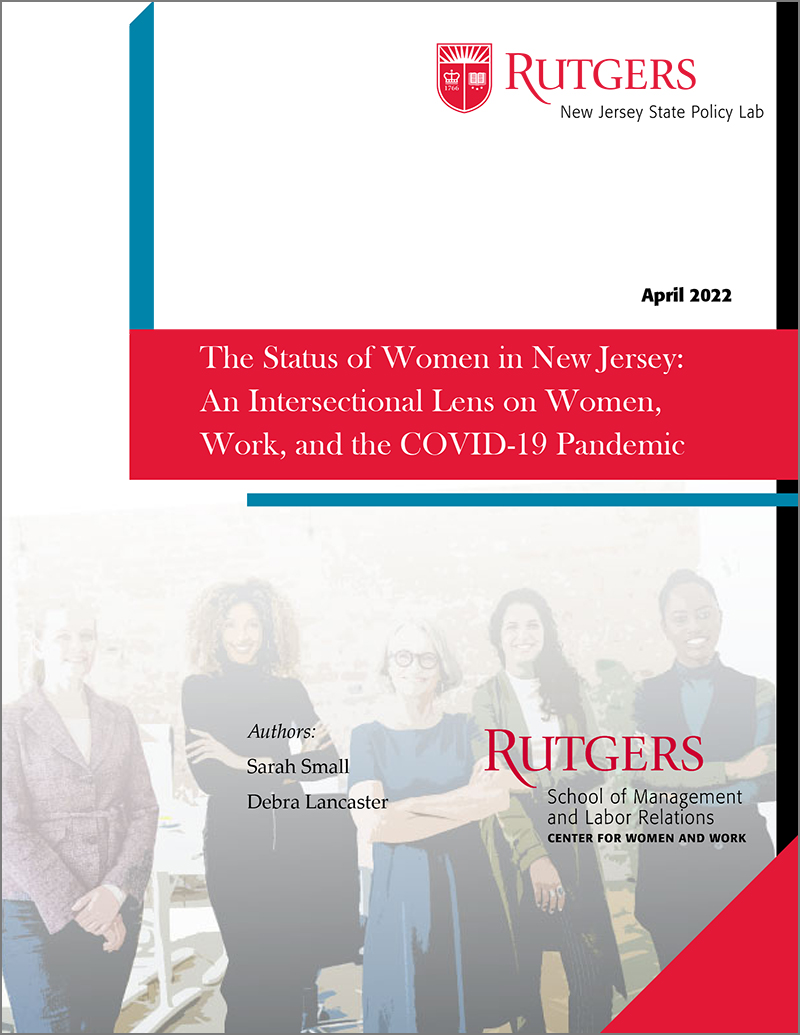
PISCATAWAY, N.J. (May 10, 2022) – Most women are back to work in New Jersey, but not necessarily back to normal.
 A new report by the Rutgers Center for Women and Work, supported by the New Jersey State Policy Lab, finds many women are changing how they work—cutting back on hours or trading full-time employment for multiple part-time jobs—typically because of childcare issues. Black, Hispanic, and low-income women are shouldering the biggest burdens, often for the lowest pay.
A new report by the Rutgers Center for Women and Work, supported by the New Jersey State Policy Lab, finds many women are changing how they work—cutting back on hours or trading full-time employment for multiple part-time jobs—typically because of childcare issues. Black, Hispanic, and low-income women are shouldering the biggest burdens, often for the lowest pay.
“This is the part of the ‘She-cession’ that no one is talking about,” said Debra Lancaster, Executive Director of the Rutgers Center for Women and Work. “Labor force participation rates among women have largely recovered in New Jersey, but that’s only part of the story. Thousands of women are sacrificing full-time employment, higher wages, health insurance, and other benefits for the flexibility to care for young children and aging parents.”
Researchers analyzed four federal datasets to produce a comprehensive, 72-page report on The Status of Women in New Jersey. They found:
- Big Picture: Women’s unemployment peaked at 18.4% in April 2020 and outpaced men’s unemployment through the end of 2021.
- Pay Gap: Women held 63.4% of frontline essential jobs at the height of the pandemic, but they brought home substantially less. On average, men earned $56,506 and women earned $40,664 in frontline roles. Hispanic women earned the least: just $27,082.
- Multiple Jobs: In 2018, 4.4% of men and 4.3% of women held more than one job. The numbers trended in opposite directions during the pandemic. By the end of 2021, 4.1% of men and 5.2% of women – including 5.7% of Black women – held multiple jobs.
- Childcare Access: Even after schools returned to in-person instruction, 23.1% of families still experienced childcare disruptions in the last six months of 2021. The number was even higher for low-income families (26.9%) and Hispanic families (26.8%).
- Difficult Choices: Many women in households earning less than $50,000 cut their work hours (20.5%), left their job (14.6%), or took unpaid leave (13.2%) because of childcare disruptions. By contrast, women in middle-income and high-income households were more likely to take paid leave or supervise their kids while working from home.
“The childcare crisis never went away for many low-income families,” said Economist Sarah Small, a Postdoctoral Researcher in the Rutgers Center for Women and Work. “Nearly a quarter of all Black and Hispanic working women cut back on their hours because of childcare issues, and five to six percent lost their job because of it. We can’t fix racial inequality in New Jersey without making childcare more accessible and affordable.”
The report highlights policies that helped women through the darkest days of the pandemic. The analysis shows that low-income families used the Child Tax Credit, Earned Income Tax Credit, and federal stimulus payments for food, clothing, rent, and utilities. The Murphy Administration’s eviction moratorium helped to reduce homelessness, while the Excluded New Jerseyans Fund was a lifeline for undocumented families and individuals re-entering from incarceration.
The researchers outline several recommendations to improve conditions for New Jersey women and their families, including:
- Improving childcare access and affordability;
- Enacting a state-level child tax credit;
- Strengthening housing protections;
- Enhancing access to preventative healthcare and mental health services; and
- Providing more support for domestic violence survivors, who experienced a higher rate of homelessness during the pandemic.
Press Contact
Steve Flamisch
Rutgers School of Management and Labor Relations
848.252.9011 (cell)
steve.flamisch@smlr.rutgers.edu
About the School
The Rutgers School of Management and Labor Relations (SMLR) is the world’s leading source of expertise on managing and representing workers, designing effective organizations, and building strong employment relationships.
SMLR’s Center for Women and Work (CWW) engages in research, education, and programming that promotes economic and social equity for women workers, their families and communities.
The New Jersey State Policy Lab is an independent, nonpartisan research center operated by the Bloustein School of Planning and Public Policy and the School of Public Affairs and Administration at Rutgers University. The New Jersey Office of the Secretary of Higher Education administers the partnership that funds the Policy Lab.
###


